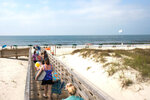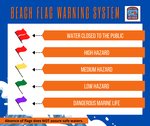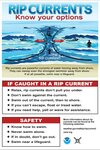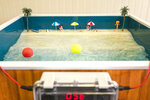As the weather warms, and beachgoers begin to crowd the beach once again, it is important to brush up on beach safety to ensure your beach trip goes smoothly. According to City of Gulf Shores Beach …
This item is available in full to subscribers.
Please log in to continue |




As the weather warms, and beachgoers begin to crowd the beach once again, it is important to brush up on beach safety to ensure your beach trip goes smoothly. According to City of Gulf Shores Beach Safety Chief Joethan Phillips, the spring typically brings an increase in lifeguard rescues due to the unruly weather and increased rip currents.
In fact, Phillips said there were 249 lifeguard saves last year, with 150 of those before the Memorial Day holiday.
"The surf conditions are worse in the spring because of the weather and storms, and the sand is still moving," Phillips said. "This past season we saw more rip currents, and some areas were harder for us to get to."
As Phillips mentioned, rip currents can be one of the most dangerous elements when taking a dip in the Gulf. According to a social media statement from Gulf Shores Fire and Rescue, rip currents are powerful currents of water that move away from the shore, and a danger to even the strongest of swimmers.
In August 2023, several Baldwin County public safety agencies gathered for a roundtable discussion on beach safety to discuss these beach hazards and potential risks, safety guidelines and best practices for beachgoers.
According to Gulf Shores Fire and Emergency Services Chief of Staff Melvin Shepard, the best way for beachgoers to stay safe in open water is to be prepared and educated on safe swimming practices.
"It is important to know how to escape rip currents. You need to remain calm and float because once you start to panic it's hard to stop," Shepard said. "Check weather and surf conditions daily before going out to the beach, and if you get caught in a rip current wave and call for help."
Shepard also added that swimmers should always stay alert, as there can be drownings and rescues on "calm" days as well. He also urged swimmers to not overestimate their swimming abilities, and refrain from using inflatable devices to increase their safety when swimming in open water.
"There are still rescues and drownings on yellow and green flag days, and we pull people out on calm days as well," Shepard said. "Most people who come down here think they are a great, phenomenal swimmer, but in my experience most people shouldn't even be trusted to take baths. Parents may enroll their kids in a two-week swim instruction course, but it is important to teach your kids more than that and beyond just one session."
However, Shepard added that the city and fire department have taken precautions in hopes of decreasing the amount of saves this season, including the newly completed beach renourishment project which he said could potentially decrease lifeguard saves needed.
"Now, we have several full time guards and five full time lieutenants, (and) as soon as the second week of March, we will have lifeguards on the beach. We are trying to hire 36 seasonal lifeguards this year, which are six more than last year," Shepard said. "Last year with the beach being eroded the way it was, it created more dangerous areas, and that erosion occurred over time. Hopefully the (beach renourishment) project will help the dangerous areas we had last year."
To opt in to the city's Beach Safe campaign, which sends free daily beach conditions via text, text ALBEACHES to 888-777 to receive daily beach conditions via text messages.
Beach and weather conditions are also included in Gulf Coast Media's The Wave newsletter, emailed for free to readers twice a week.